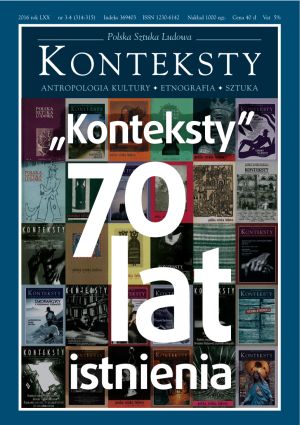Próba krytyki nowoczesnego „ja”: literatura – filozofia – teologia – świadomość europejska
Attempt at a Critique of the Modern ”I”: Literature – Philosophy – Theology – European Awareness
Author(s): Lech SokółSubject(s): Philosophy, Fine Arts / Performing Arts
Published by: Instytut Sztuki Polskiej Akademii Nauk
Keywords: modernity; philosophy; self;
Summary/Abstract: The author’s understanding of modernity differs from its ordinary comprehension, with the source of his inspiration being Eric Voegelin (1901-1985), in this case predominantly as the author of From Enlightenment to Revolution. Modernity is a disassembly of the paradigms of the culture of the West, founded on Greek rationalism, the Roman legal system, Jewish spiritualism, and Christianity. This process emerged already in the second half of the thirteenth century and its intensification grew at different rates. More, it exerted a fundamental impact on the concept of the “I”. The problem occurred vividly in Ibsen’s drama Peer Gynt (1867), with the “I” appearing as purely instinctual and a register of experiences rendered inedible in an order chronologically reversed in relation to the time of their realisation: from the present towards an increasingly distant past. This is the “I” depicted by Ibsen in his drama and subsequently staged. There took place a parting of ways with the substantial “I”, which proved to be illusory and found its counterpart in the once renowned book by Max Stirner (1806-1856): Der Einzige und sein Eigentum, 1845; in the case of both authors the definition of the instinctual Ego is intriguingly similar although Ibsen probably did not read Stirner and the latter could not have been familiar with Ibsen’s drama. Stirner was also responsible for the appearance of negatively conceived nihilism, of importance for the problem of modern man. An extremely early warning against the illusory and demonic power of the human “I” was made by its unusual interpretation in Teologia deutsch (an anonymous treatise from the second half of the fourteenth century). A great role in the origin of this treatise was played by Dominican mysticism from the Rhineland and, first and foremost, by Meister Eckhart, calling for a rejection of the “I” for the sake of unio mystica with God. The author of Teologia deutsch radically condemned its cult; one of the brief citations most aptly reflecting his approach states: “He who assists man in fulfilling his will [and cultivating the “I”] helps him in that, which is the worst”. In philosophical-aesthetic texts, dramas, novels, and essays written from 1917 to his suicide Stanisław Ignacy Witkiewicz (Witkacy, 1885–1939) defended metaphysical man, the Individual Being, having himself experienced the Great War and the Russian Revolution. Once religion collapses and totally vanishes (which, in Witkacy’s opinion, had already taken place) then art, philosophy, and man, in the traditional meaning of the term, will also become subjected to annihilation. There will remain new and truly modern people de nomine only. As can be seen, the narration of my essay progresses in accordance with the order of the examined problem and not chronology.
Journal: Konteksty
- Issue Year: 314/2016
- Issue No: 3-4
- Page Range: 207-220
- Page Count: 14
- Language: Polish
- Content File-PDF

